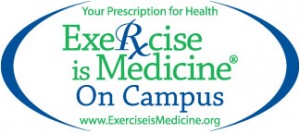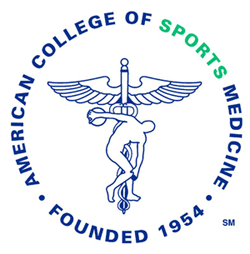Tremendous health benefits are seen with even low levels of exercise.
Provided in partnership with Exercise is Medicine and the American College of Sports Medicine.
Tremendous health benefits are seen with even low levels of exercise. The amount of exercise needed to benefit health is much lower than amount
needed for fitness.
 According to the Exercise is Medicine (EIM) program, regular physical activity can:
According to the Exercise is Medicine (EIM) program, regular physical activity can:
- Reduce risk of heart disease by 40%.
- Lower risk of stroke by 27%.
- Reduce incidence of diabetes by almost 50%.
- Reduce incidence of high blood pressure, by almost 50%.
- Reduce mortality and risk of recurrent breast cancer by almost 50%.
- Lower risk of colon cancer by over 60%.
- Reduce risk of developing of Alzheimer’s disease by one-third.
- Decrease depression as effectively as medication or behavioral therapy.
U.S. Physical Activity Guidelines for Adults (18-64)
 The American College of Sports Medicine recommends that adults participate in at least 150 minutes per week of moderate-intensity physical activity. With this understanding, find a challenging yet realistic starting point upon which you can build over time. Don’t overwhelm your system by doing too much, but don’t underwhelm your system by doing too little. While devising your schedule—that is, minutes per day and days per week of exercise—also recognize any obstacles that may impede your progress. Read more at acsm.org.
The American College of Sports Medicine recommends that adults participate in at least 150 minutes per week of moderate-intensity physical activity. With this understanding, find a challenging yet realistic starting point upon which you can build over time. Don’t overwhelm your system by doing too much, but don’t underwhelm your system by doing too little. While devising your schedule—that is, minutes per day and days per week of exercise—also recognize any obstacles that may impede your progress. Read more at acsm.org.
Before you start any exercise program, please review the Pre-participation Checklist. If you answer “yes” to any checklist items, we advise you to talk to first your doctor about the type of exercise that is safe for you. For more assessment tools and to customize your exercise plan, download the EIM Public Action Guide.
For further information, please contact:
Todd Wilson
Strategic Communications Director
p – 516.237.8634
e – twilson@adelphi.edu